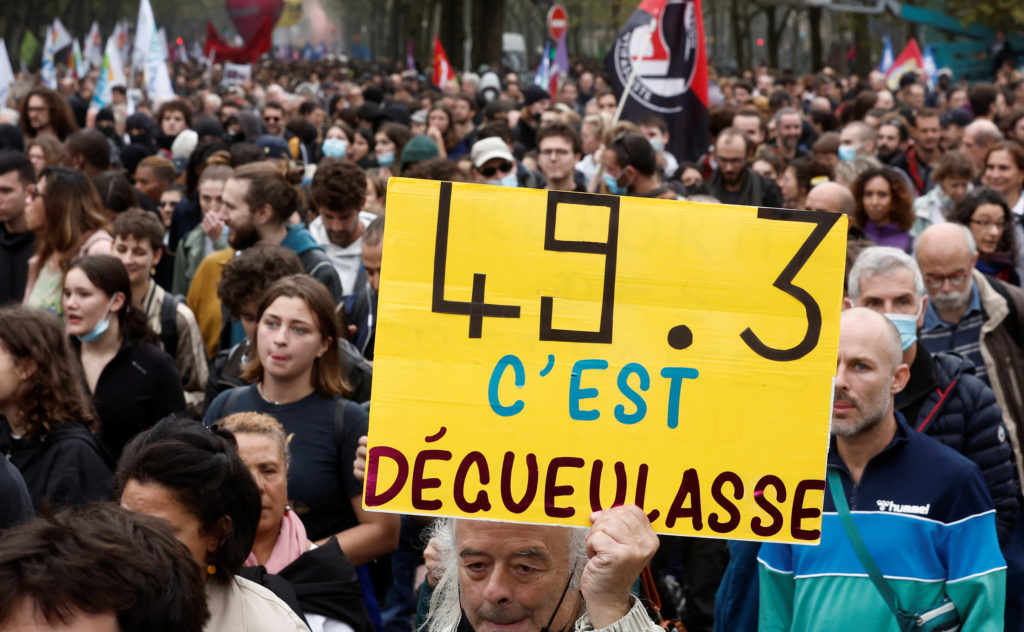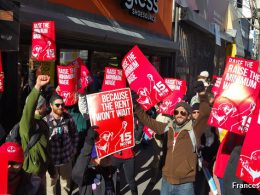By Nicolas Croes — LSP/PSL (Left Socialist Party–our sister organisation in Belgium)
This May Day will be the 13th day of strikes and demonstrations called by the union coalition against Macron and his pension reform. Whether it will represent a major escalation in this historic wave of revolt remains to be seen, but every poll highlights the overwhelming opposition to the reform and the support for the social movement. However, the simple succession of demonstrations loosely linked to each other — the strategy of so-called “leapfrog” mobilisations — is not enough.
Speaking about the problem of the formidable opposition to the government and the presidency, a member of the Executive expressed himself anonymously in the Journal du Dimanche on 8 April: “There is too much tetany in our reaction. We have to put things into the atmosphere, like immigration or something else. Otherwise, we’ll never succeed in crushing the pensions.” And this is of course what the priorities announced by the President on 17 April, between now and 14 July, are all about. These included “strong announcements” against delinquency and “all social or tax fraud”, while promising to “reinforce the control of illegal immigration”. Economy and Finance Minister Bruno Le Maire was clearer in linking social fraud and immigration: “Our compatriots are legitimately fed up with fraud. They are fed up with seeing people who can receive aid (…), send this aid back to North Africa or elsewhere, when they are not entitled to it”.
What this shows is that the government is considering all the tactics available to it to divide and weaken the movement, while showing no sign of relenting. And what this means for the movement is that stopping or abating the struggle is not an option — we need to sweep away Macron, his government and all its vicious, anti-social policies.
The biggest social movement since May ‘68
Notwithstanding the scale of the movement we still hear the refrain: ‘people are not active enough’. The simplistic explanation never makes sense on closer inspection, but it has rarely been so easy to refute. The first 12 days of strikes and demonstrations affected more than 300 cities, some of which haven’t seen such protests in living memory. The record for the biggest protest in modern history was broken not once but twice, with an estimated 3.5 million demonstrators on the streets on 7 March and again on 23 March. Not since 1995 or even 1968 has the situation “been so socially and politically blocked”, according to social conflict specialist Guy Groux.
Furthermore, the support for the struggle has consolidated and strengthened as time has gone by: 59% in January, 66% in March, and 72% in April. With each attempt by the government to show “pedagogy”, patronising and condescending to those opposed to its policy, the movement gained in popularity. After the disturbances caused by the strikes and blockades, which were exaggerated by pro-establishment journalists, a poll for Le Point on 19 March showed that 74% of French people were in favour of the motion aimed at bringing down the government. And when the union coalition spoke of “blocking the country”, i.e. shutting down the economy, 67% considered that justified.
One week after the use of article 49.3 of the Constitution (which allows the National Assembly to be overruled), 62% thought that the movement should be further strengthened. This is another indication that the massive 3.5 million demonstrators at the peak of the movement does not represent its full potential — more, much more is possible.
The trap of institutional solutions
At the same time, the movement has been uneven, varying in force and tempo. On the one hand, some workers’ bastions had been on continuous or intermittent strike from 7 March until the second half of April, and on the other, some sectors were only mobilised during the ‘days of action’ called by the union coalition. On top of this there are workplaces and sections of society that support the movement but are not yet active participants, because they are fearful about taking action — often due to the lack of trade union presence around them. In short, a huge potential force has not yet been activated.
The impasse presented by the strategy of “leapfrog mobilisations” is clear. But the main proponents of this strategy, which is geared towards respecting state institutions and containing social anger, are now arguing that the struggle should be shifted even more towards these institutions. This is evidenced by the demands for a referendum tabled by the New Popular, Ecological and Social Union (NUPES) — an electoral alliance built around France Insoumise and including the Communist Party (PCF)], Europe Écologie Les Verts and the Socialist Party (PS) with the support of the leadership of the CFDT and the CGT unions in particular. A first application for a referendum was invalidated by the Constitutional Council, a second will know its fate on 3 May. If it is given the green light, a period of nine months will be given to collect the signatures of 10% of the electorate (around 5 million people) and, if it is validated, a six-month examination procedure in Parliament would be set in motion.
However, this procedure is not binding in any way. It also includes a number of mechanisms that are real backdoors for the powers that be. But most worryingly, taking this route would be used as a pretext to stop the strikes and mobilisations in the streets. Macron and the mainstream media would immediately take advantage of the space opened up to instil racism and other divisive elements into the situation. Postponing the struggle without a serious tactical and strategic perspective is the essential ingredient in a recipe for demoralisation, and a rise in cynicism and fatalism.
Not everyone views the referendum tactic in the same way, however. Within France Insoumise there is also a sincere desire to bolster the struggles. Jean-Luc Mélenchon, for instance, has stressed that “the struggle is what counts”. He had also called on the union coalition to launch a general strike on 6 April, as in May 68, for fear of “a weakening of the struggle”, arguing rightly that, “it would be unifying and would show strength“. This is a real contrast with the rest of the NUPES and notably the PCF, whose national secretary Fabien Roussel now wants to ”talk to the whole left” — even Bernard Cazeneuve, former Prime Minister under François Hollande and champion of government by ordinance!
The best way to build towards a general strike is to organise the grassroots, not focus on the leaders of political organisations. The conservatism from the top is the main problem for the movement. In any case, the success of a general strike depends on maximum involvement in the struggle. We need everyone.
Also in this context, La France Insoumise’s handling of the Quatennens affair was damaging. Quatennens is a member of parliament who was convicted of intra-family violence, but was not expelled from La France Insoumise’s parliamentary group. Such an approach is undoubtedly an obstacle to actively involving women in the struggle.
Building a renewable general strike
Among the radical left, and even beyond, there is no shortage of voices demanding a renewable general strike. The calls are often abstract, almost like wishful thinking, ranging from pleas to the leaders of the union coalition to the most brutal attacks against them. Without doubt we would be in a totally different position if the union leaders had adopted a different strategy. But this union coalition, the first since the struggle against the pension reform of 2010, has remained united for so long — even after the law has been enacted, which is unheard of — because there has been huge pressure by the masses at every stage. The mobilisation of the rank and file has ensured the solidity of the union coalition.
A multitude of events of varying magnitudes has warned the trade union apparatuses of the risks of betrayal. The Yellow Vests movement had, in its own way, expressed impatience and frustration with a trade unionism without ambition. This type of criticism has found its way into trade unions themselves, as illustrated by the recent CGT congress, where the succession of the general secretary Philippe Martinez was shaken up in an unprecedented way. For the first time, the person appointed by the outgoing leadership had to give way to another. Confidence in the trade unions has grown since the beginning of the movement, that’s for sure, as has the number of affiliations, but they have come bearing a critical view of recent decades of trade union struggle.
Renewable strike action has been seized upon in some sectors during this struggle, particularly in energy, chemical-oil, refuse collection, and waste treatment. Most of them are now finished, which doesn’t mean that they can’t be revived having caught their breath, like the refuse collectors. But the fact is that it is impossible to hold on in the long term without extension and enlargement.
The bastions of the workers’ movement, even if they are weaker today than in previous decades, remain the key instrument for a victorious movement. They were spearheaded by the local public transport workers of RATP (Régie Autonome des Transports Parisiens) and the railway workers in 2019. It is necessary to analyse why this has not been the case in the same way now. Today it is the refineries, in the wake of last autumn’s movement on wages, which served as a dress rehearsal in more ways than one. In all these bastions, the CGT plays a central role.
The key role of strike committees
The organisation of broad, democratic strike committees makes it possible to bring together combative workers to reflect, make decisions, and take action beyond the union delegations. In 2016, only 11% of workers were unionised and only 6.9% went on strike that year against the Labour Law, but 43% voted in the professional elections (a figure made all the more impressive by the fact that many workers are unable to participate because of the lack of a ballot organised at their workplace). This illustrates the potential to strengthen and broaden the dynamic of the struggle. But this cannot be done by simply saying “join the CGT”.
General assemblies already exist in many workplaces and schools and they are crucial to get away from the idea that discussion of our struggle is limited to external communication. They must be first and foremost forums to discuss and debate the programme, strategy and tactics of our struggle, focused on the tasks of building the renewable general strike.
That’s why we have defended the establishment of democratic, anti-Macron strike committees in the movement, aimed at bringing together all workers, whether union members or not, and to do the same in schools and universities, but also in working-class communities.
One of the central issues for such committees is the development of the strike funds. Big industry or community meetings could be organised on the initiative of these committees by inviting a delegation of strikers from the most advanced strongholds in the struggle to present to the struggle elsewhere, instilling confidence and the sense of solidarity, while discussing how best to deepen and extend the strike. This would go a long way to winning over waverers. In Paris, for example, a queer solidarity fund has raised over €50,000 from LGBTQIA+ community initiatives! Strike funds have also been set up by bakers in the North and other independents, illustrating that when the working class takes action, it can pull other layers of society behind it, displaying its role as the most powerful, progressive force in society. An IFOP poll showed that 62% of the leaders of very small enterprises (VSEs) were not in favour of the reform and supported the movement.
More attention must also be paid to bringing new sectors and strata, especially young people, into the fold. Recapturing the momentum of the 2006 youth mobilisations in the struggle against the Contrat Première Embauche (CPE), the last major victory of a social movement against a government project, must be the objective. But already this year, beyond the protests and the occupations of high schools and universities, delegations of young people have, for example, come to assist in the blockades of incinerators, which gave the strikers a boost. The next stage of the struggle should include initiatives towards the occupation of workplaces. Where better to bring together the different local initiatives and coordinate them than in the heart of the workplaces?
In this respect, we would particularly like to highlight the power cuts and restorations, dubbed ‘Robin Hood operations’, which targeted financial and employer institutions or large companies, cutting off their electricity, while ensuring the provision of free gas and electricity for schools, hospitals, low-income housing, public sports centres, and public interest associations. They also re-established distribution to users who had been cut off because of unpaid bills, and offered a reduced rate of up to 60% for small traders — who received no comparable help from the government in the face of soaring prices. Although these actions were relatively small in scale, they provide an important insight into how the wealth produced by workers could be managed under a democratic socialist society.
A society run for and by workers
At all the actions there has been no shortage of literature ending with the need to do away with “Macron and his world”. But what this means has varied wildly. Was it the end of the government, of Macron’s presidency, of capitalism? And to be replaced by what? These questions deserve to be answered. Working out where we want to go is the best way to get there.
This fight goes far beyond defeating the pension reform. In reality, it is a fight to bring down Macron-Borne and of all of their austerity policies.The generalisation of the renewable strike is a central step, but it is only a step in the confrontation with the capitalist state and the system itself. We should popularise the call for a “march of millions” from the regions to the Élysée Palace, combined with the proliferation of ‘Robin Hood actions’, as part of an escalation that brings the economy to a halt.
The Fifth Republic has proved to be a republic of and for the rich, not the majority — us! By organising the renewable general strike from below, creating and consolidating organs of working-class democracy throughout society, we could lay the foundations for a genuinely revolutionary constituent assembly based on the elected delegates of the local struggle committees, as a necessary step towards a truly democratic government of workers and all oppressed people. Only in this way could we build a society that provides for all the needs of all people, by taking back the resources and wealth we collectively produce, and using them in our collective interests.
We have not yet reached the heights of mass revolt witnessed in May 1968, a revolutionary experience that made socialist revolution in France a very real prospect. Had the French working class been successful it could have led to the rising of workers and the collapse of capitalist regimes all over Europe in domino fashion. That revolt exploded from below, just as this one has, and therefore similar potential does exist in this situation. All eyes are on France now in this world where capitalism is bogged down by one crisis after another.
We can sweep away Macron and his government. This is eminently achievable. That doesn’t mean we’ll have a workers’ government straight away. But whatever government follows will have great difficulty in implementing any anti-social programme — which is demanded by the logic of this capitalist system in crisis — because it will be confronted from the outset with a confident workers’ movement, with a numerically and qualitatively strengthened vanguard, but also with broad layers of workers and young people newly enriched with lessons about the struggle to overthrow exploitation and oppression.
Against the dictatorship of the markets, for workers’ democracy
* Return to retirement at 60.
* For a minimum pension in line with a minimum wage increased to €2,000 net per month.
* For the immediate increase of all wages by 10% and the return of the sliding wage scale. Place low-wage sectors under public control to ensure staff have proper status, with decent wages and working conditions.
* Guaranteed employment and leisure time: for a collective reduction in working hours, with no lowering of pay, with compensatory hiring, and decreased production rates. For the economic independence of women and the end of precarious employment.
* For massive public investment in the healthcare and wellness sectors, in education, social housing, sustainable public transport, as well as climate protection measures. Public services must respond to people’s needs; they must be high quality, accessible to all, and less than 30 minutes from places of residence.
* Expropriation, seizing the wealth of billionaires, and reintroducing the wealth tax.
* Nationalisation of the energy and banking sectors under the control and management of the working class.
* The Fifth Republic has proven to be a republic of and for the rich. We support building a true revolutionary democratic constituent assembly based on the elected representatives of struggle committees in communities, workplaces, universities, and schools, as a necessary step towards a truly democratic workers’ government functioning according to the needs of all, not the profits of a few.
* We need an economy under democratic public ownership and ecologically planned with real democratic control exercised by the workers of companies and society as a whole to create millions of sustainable and well-paid jobs and to build a new green economy.
* Towards a democratic socialist society based on the needs of the working class, young people, and the oppressed of the planet.












